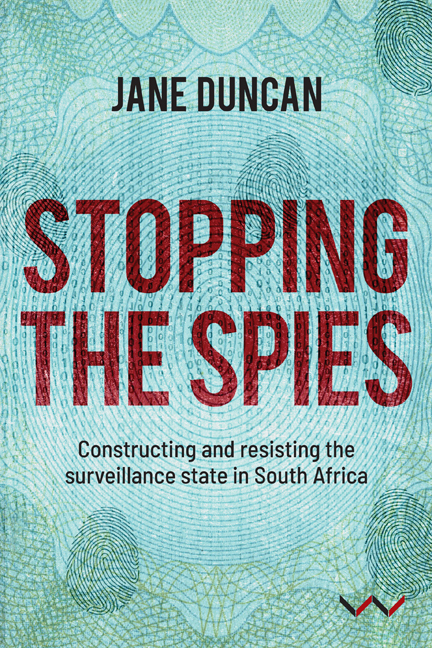Book contents
- Frontmatter
- Contents
- Acknowledgements
- List of Figures and Tables
- List of Acronyms
- Preface
- Introduction
- Chapter 1 Theorising the surveillance state
- Chapter 2 Is privacy dead? Resistance to surveillance after the Snowden disclosures
- Chapter 3 The context of surveillance and social control in South Africa
- Chapter 4 Lawful interception in South Africa
- Chapter 5 State mass surveillance, tactical surveillance and hacking in South Africa
- Chapter 6 Privacy, surveillance and public spaces in South Africa
- Chapter 7 Privacy, surveillance and population management: the turn to biometrics
- Chapter 8 Stopping the spies: resisting unaccountable surveillance in South Africa
- Chapter 9 Conclusion
- Notes
- Select Bibliography
- Index
Chapter 5 - State mass surveillance, tactical surveillance and hacking in South Africa
Published online by Cambridge University Press: 17 May 2019
- Frontmatter
- Contents
- Acknowledgements
- List of Figures and Tables
- List of Acronyms
- Preface
- Introduction
- Chapter 1 Theorising the surveillance state
- Chapter 2 Is privacy dead? Resistance to surveillance after the Snowden disclosures
- Chapter 3 The context of surveillance and social control in South Africa
- Chapter 4 Lawful interception in South Africa
- Chapter 5 State mass surveillance, tactical surveillance and hacking in South Africa
- Chapter 6 Privacy, surveillance and public spaces in South Africa
- Chapter 7 Privacy, surveillance and population management: the turn to biometrics
- Chapter 8 Stopping the spies: resisting unaccountable surveillance in South Africa
- Chapter 9 Conclusion
- Notes
- Select Bibliography
- Index
Summary
This chapter focuses on mass surveillance, tactical surveillance and hacking in South Africa. It seeks to answer the following questions: Are the kinds of abuses that were revealed by Edward Snowden possible in South Africa, and what in fact is the relevance of Snowden's revelations (if any) for the country? To what extent is South Africa subjected to these forms of surveillance by other countries, especially the Five Eyes, and to what extent does South Africa itself engage in them, too? Needless to say, answering these questions is extremely difficult, given the high lev-els of secrecy, but it is not impossible to build up some sort of picture, drawing on existing sources.
SOUTH AFRICA AND THE GLOBAL MASS SURVEILLANCE DRAGNET
South Africa's position in the global mass surveillance picture needs to be considered on two levels: as a target of mass surveillance and as a user and producer of mass surveillance equipment. In relation to South Africa as a target, according to documents leaked by Snowden about the NSA's Boundless Informant programme (the programme that initially triggered Snowden's concerns about surveillance of US nationals), southern Africa as a whole is of little interest to the NSA, though South Africa is of slightly more interest than other countries in the region. Predictably, the NSA's attention was focused much more on North and East Africa, especially Egypt, Kenya, Somalia and Libya.
Furthermore, South Africa is not listed as being part of the worldwide signals intelligence operation spearheaded by the NSA in co-operation with its Five Eyes partners, involving the sharing of intelligence, not even as a regional partner. Rather, their main focus areas were countries that could provide intelligence on the activities of Russia and China. Given the sheer scale of the signals intelligence operations, the NSA was concerned about entering into partnerships with other countries to expand its intelligence-gathering capabilities. Several African countries struck up third-party agreements with the NSA to assist it in signals intelligence-gathering, among them Algeria, Ethiopia and Tunisia. South Africa was not included in the names of those disclosed.
However, it would seem from the Snowden revelations that South Africa has not slipped under the NSA's radar completely. The agency intended to build a real-time map of global internet traffic, called the Treasuremap project.
- Type
- Chapter
- Information
- Stopping the SpiesConstructing and resisting the surveillance state in South Africa, pp. 113 - 140Publisher: Wits University PressPrint publication year: 2018



